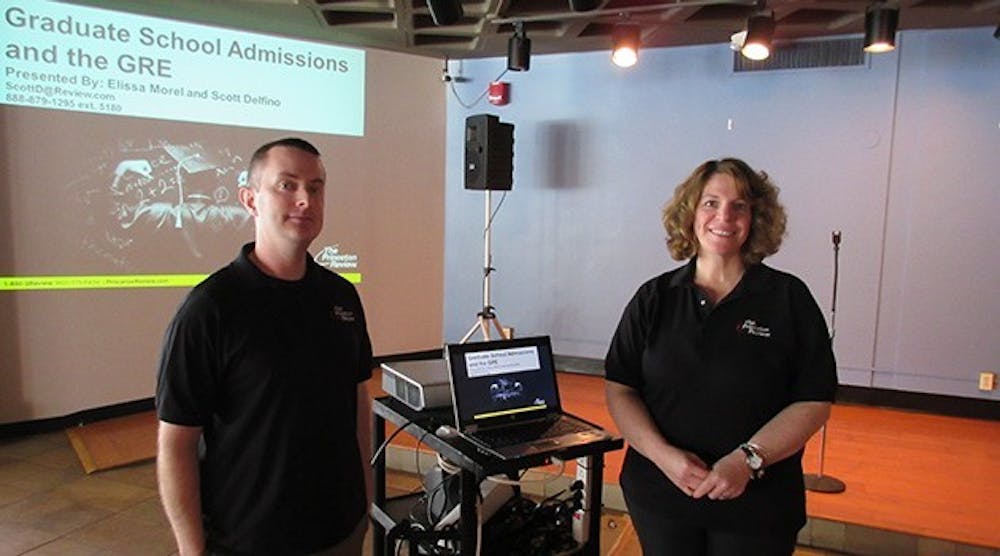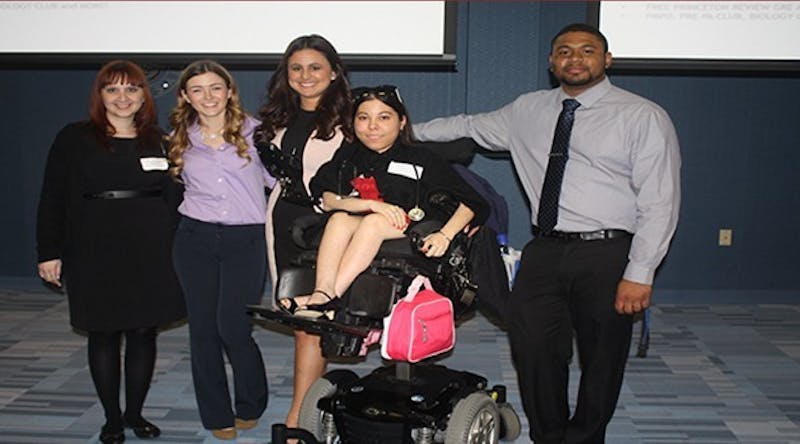Scott Delphino and Elissa Morel representing The Princeton Review
Photo Credits: Michael Dumaine
Life after college is always a daunting thought to any individual faced with this inevitable predicament. Sooner or later, students will outgrow the university that they have come to know and love, and be confronted by the cold realistic world. In this situation, graduate students can usually make one of two choices: go to graduate school or find a job. Continuing one’s education can be a very important procedure for some majors, and will unsurprisingly look better on a resume. It’s no secret that in most scenarios, the higher the degree, the higher a person will get paid in their career. With benefits such as these, continuing education continues to be a seriously considered topic amongst students approaching graduation. The Princeton Review hosted a graduate school preparation event in the Cougar’s Den, teaching the admission process, as well as other essential information on the subject.
The event was held by two representatives ofThe Princeton Review. “If you are applying to grad school, the graduate record examinations [GRE] is the standardized test to take,” Elissa Morel, premium tutor, The Princeton Review, stated as she began the ceremony. It is a general aptitude test that most commonly notes a person’s abilities of math and English, and is usually required for any graduate program. An average score on the test is a 150, with 170 being the highest possible score and 130 being the lower side of the spectrum. The overall test is computer based, and costs $195.00. The testing centers that offer the GRE in New Jersey are located in Toms River, Hamilton, Deptford, West Orange, Clark, and Fair Lawn. Morel insists that “you should plan to take the GRE six months before the earliest application deadline of a particular grad school.” The benefit of this is in case of failure or poor scoring, the test can always be retaken. Studying should also take place prior to the exam; however, it is not necessary to study math and English. What is more important is to study the language the GRE speaks in. In other words, the test may express questions in a different format than what one might be used to, and it is important to understand exactly what the question is asking. For each section, 35 minutes is prearranged for 20 questions. This means less than 2 minutes is given to completion a question.
More information can be found onprincetonreview.com concerning the GRE. They offer both a free online practice test, as well as a list of paid classes and private tutoring sessions strictly pertaining to the exam. “A great test score on [the] standardized test greatly increases your chances of getting into a top notch grad school,” Scott Delphino, territory manger, The Princeton Review, exclaims as he wraps up his GRE portion of the event.
Aside from the GRE, many preparations should be taken before applying to graduate school. Lists should be made as well as goals to complete. Considering one’s criteria for a graduate institution is the first step to take amongst this long but rewarding process. The leading factor would be finical support. School is not cheap and graduate school is no exception. Financial aid including loans, grants, and scholarships that are applicable should all be taken into account when deciding on a school. Another important factor would be the school’s career services department. Ultimately, this department is the most influential, considering the whole point is to get a career later on.
Once deciding upon schools of interest, the applications begin! Aside from the GRE, at least two letters of recommendation are advised. Professors are always a solid choice for letters of recommendation, as well as a boss if a student works on campus. Another option would be the director of the pertaining major.
Some schools may require an interview to go along with an application. In this case, make it a priority to attend their first scheduled interview. Try not to reschedule unless truly necessary. The first question is frequently pertaining to the reasoning of being involved in the school for the graduate program. Make sure to be prepared to answer commonly asked questions. For fine arts majors, a portfolio is usually required to showcase skills in areas such as art, photography, or experience regarding various computer software programs. Performing arts majors may be required to complete a live performance in their selective field. Aside from the interview process, make sure to have a clearly expressed and properly formatted professional resume. Other documents that should not be forgotten are transcripts and co-curricular transcripts to showcase experience and involvement throughout one’s undergraduate years.
The Princeton Review offers free practice testing and numerous helpful hints and tips to tackling the subject of graduate school. Whether it is the GRE, the interview process, or just basic ideas,The Princeton Review can aid in making the best choice for a further education.




